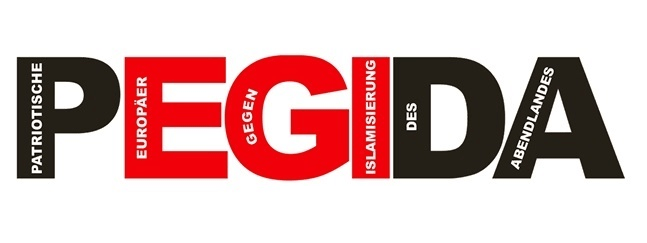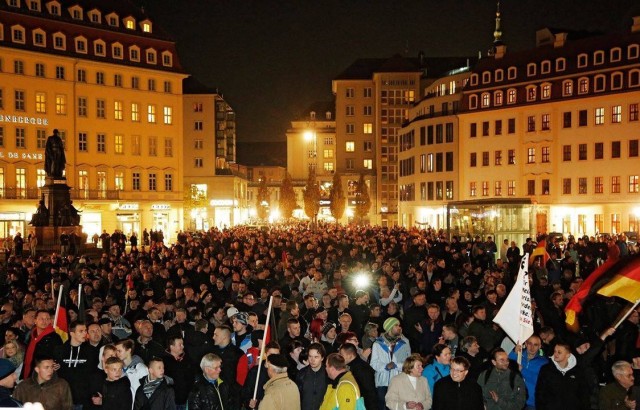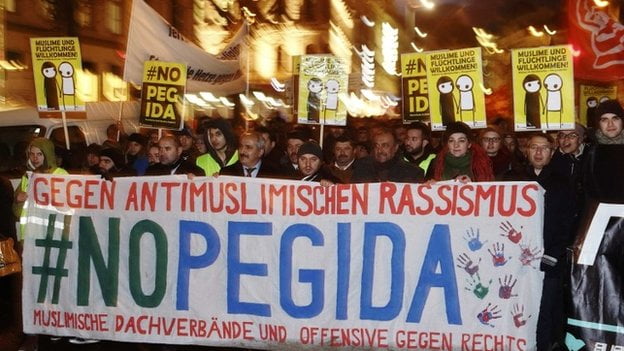A posse of policemen stood ready with truncheons in hand as last Saturday, a political group known as the ‘Patriotic Europeans against the Islamization of the West,’ commonly known as PEGIDA, marched through the streets of Newcastle. The crowd, with banners of ‘Keine Islamisierung Europas’ or, ‘No Islamization of Europe sang, shouted and marched on wildly and, even though the attendance was only a fraction of the 25,000 that joined them in Dresden, Germany it was symbolic of the cultural precipice Europe finds itself in. Great Britain ultimately was only the next European country to host an anti-Islam protest after Germany, Austria, France and Belgium. And the fact that the protest was so close to home for the millions of immigrants in the U.K lends credence to the fact that certainly, relations between locals and outsiders are at an all-time low.
Since the beginning of the new millennium, tensions have been on the rise between native residents, and the growing number of ‘outsiders’ that have found their way into Europe. With the new immigration laws in place, it has become easier for foreign nationals to enter, work and reside in the European Union, a privilege previously deserved for the affluential, and the minority skillsets from the third world. So easy in fact, that asylum seekers and skilled professionals from abroad have grown in value to the society relative to their local counterparts. Germany, the host and birthplace of the PEGIDA, is especially in turmoil, on the edge of what political scientist Samuel P. Huntington termed as the ‘clash of civilizations.’ It is true that none of the cities in Germany, except Dresden have bent to the PEGIDA’s charms, but the fact that the overwhelming majority in both Germany and EU have been relatively less vocal than their xenophobic counterparts signifies the almost frayed relationship these immigrants now share with the locals. In fact, parties such as the CSU and the CDU of Germany have been slow to condemn it, and have even silently recruited them to their core voter base.

However, as xenophobic its position is, the party’s extroverted Islamophobia is what has the country and the continent rattled presently. As unfortunate as the attacks on Charlie Hebdo were, they precipitated violent retributions against Muslims and triggered what would soon become the largest protest against an ethnic minority since the 1940’s. And yet, the surprise with which these protests have taken the establishment is confounding as such has been the slow tremor for over a decade, ever since the events of 9/11 and later, the Madrid and London bombings. This is particularly so in Germany, the country which played host to the hijackers in the Hamburg Cell.
Commentators have correctly used terms like ‘misogynistic,’ ‘racist,’ ‘xenophobic’ and even ‘Neo-Nazi’ to describe the Patriotic Europeans against the Islamization of the West, which is contrary to its rather mellow position, manifesto-wise. In fact, its one-page manifesto is fairly centrist in its framing, and promises the affirmation of religious and cultural identity. However, its public position reflects otherwise, as is evidenced by its grandiose aim to re-establish the Judeo-Christian culture in Germany, a fallacy brought forth by the fact that a majority of the residents in Dresden from whom the party draws its voice, are atheists. The manifestation of such hate naturally brings into question the reasons behind the sprouting of organizations such as these, and others like the National Front in France, the British National Party in Great Britain, the Ku Klux Klan in the U.S.A and the many fringe groups in India itself.

It is consensually agreed upon that a combination of various factors contribute to the growth of groups such as these. Socio-economic factors are one, political another and extraneous factors contribute all the more differently, in a way no one can predict. In the context of the aforementioned discussion, it is therefore more prudent to take the example of Germany, both in the past and the present. After WW I, the Germans were humiliated at Versailles, which turned out to be only the beginning of a long road to re-construction and normality made more difficult by the struggles of the Great Depression. German shame and the restoration of German pride became the slogan of the Fuhrer’s Nazi surge and soon, they had the small, minority group of Jews as scapegoats for all their miseries. Cut to the new millennium and in the aftermath of New York, Madrid, London and Mumbai, an ethnic minority remains under threat by the larger majority, who haven’t had the best of times since the recession. Unemployment is low, especially among the youth, which makes them easier to place the blame placed squarely on the shoulders of religious phantoms. In other words, in the present case PEGIDA has become a vehicle of discontent where fear of Islamization is simply secondary.

With the rise of the Islamic State in the past year, the antagonism against religious groups has only grown stronger. Therefore, it is in this perspective that it is deeply heartening to see the many counter-demonstrations against groups like PEGIDA across Europe. People often forget that beyond the superficial lines of fracture that divide them, they are unified by their common needs and aspirations. It is in these times that the citizenry of the world must place faith in their legal and constitutional mechanisms. Issues such as immigration (the rigidity or the laxity of it) and the concerns about possible ‘ghettoization’ so resulting are to be dealt legally using constitutional machinery and not by protesting the right to livelihood of the overwhelming many who had nothing to do with acts of nuisance. More importantly, people must refrain from participating in or encouraging the activities of groups such as the PEGIDA.
This instance is of particular importance to our own country, a nation no stranger to the violence of hate and xenophobia. It is even more unfortunate that our citizens are treated as ‘immigrants’ or ‘outsiders’ when they move in from the North-East, or condemned to violence when they move in search of better work, such as in Maharashtra. The fact that our repugnance of such instances comes to the surface only momentarily when such come to light is reflective of how little we think of our fellow citizens. And although India hasn’t fortunately seen protests on the scale of Europe yet, the fact that few in our country know of such hate brewing in a continent associated with the ‘First World’ is troublesome. Consider the recent attacks on worship places in the heart of the Indian capital, for instance. Regardless of whoever is to blame for such a depravity, the act suggests a rising degree of contempt for minorities in the country, especially at a time when the general confidence about the State’s agenda on inclusiveness is doubtful. With the degree of diversity in our country, it is therefore imperative that we must find lessons to learn from the protests going on in Europe. However, such wisdom can only be learnt if people are made aware about the dangers of exclusion and discrimination, a lesson modern Europe is trying so hard to teach us.
Any nation is only as strong as the people who live in it, regardless of whichever community they find themselves part of. It is therefore up to each and every one of us to ensure that it lives of safely and steadily. For as the great Ernest Hemmingway once said, ‘the world is a fine place and worth fighting for,’ and we can only hope the world has learnt from the many mistakes it has been a participatory to.
By- Jibin Mathew George































